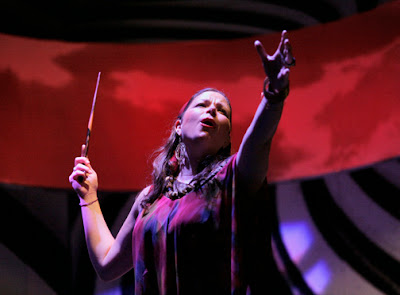Tim Smith, Opera Vivente's 'Alcina': It's groovy, baby (Baltimore Sun, October 30) Tim Smith, Free to be (Baltimore Sun, October 22) |
The Chorus of Hippies introduced early in Act I lounging on floor cushions, getting stoned, helped reinforce the tropical, beyond-reality atmosphere of this opera. Having attracted a multitude of lovers to her island only to turn them into rocks, trees, streams, and so on, after seducing them, Alcina believes she has found her true love, the strayed fiancé of Bradamante (Monica Reinagel), who is intent to win back her future husband Ruggiero (Elspeth Franks). Let the schemes and competitions begin…
 Colleen Daly as Alcina, Opera Vivente, 2007 photo by Cory Weaver |
Conductor Joseph Gascho provided exceptionally stylish leadership, though frequently failed to impose his demands on both singers and instrumentalists alike. The strings were perpetually out-of-tune, while the basso continuo lacked enough “oomph” to ground the work securely, thus leading to recurring coordination issues. All this could have been easily remedied by being unfailingly strict, as there is no room for sloppiness of any kind in such a cozy environment. Interestingly, the most complex material (lots of invertible counterpoint) often fully locked and must have been sufficiently rehearsed making it disappointing to hear simpler bits less than ideal. Take the opportunity to experience the remarkable work by an impressive company.
Opera Vivente will repeat this production on Thursday (November 1, 7:30 pm) and Saturday (November 3, 7:30 pm).
Hi Michael,
ReplyDeleteMany of the same thoughts, but I noticed you missed out one really important thing that makes this performance stand out - it's in English! I know Handel did many English works, but to the best of my knowledge, this is usually done in Italian, so OV is on to a good thing here.
Cheers,
-Varun.